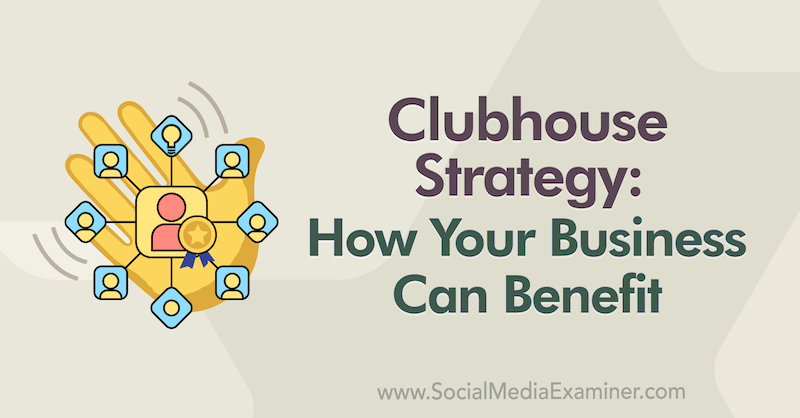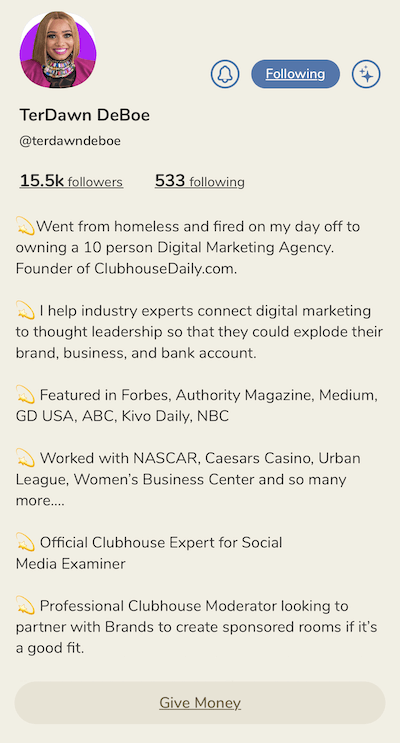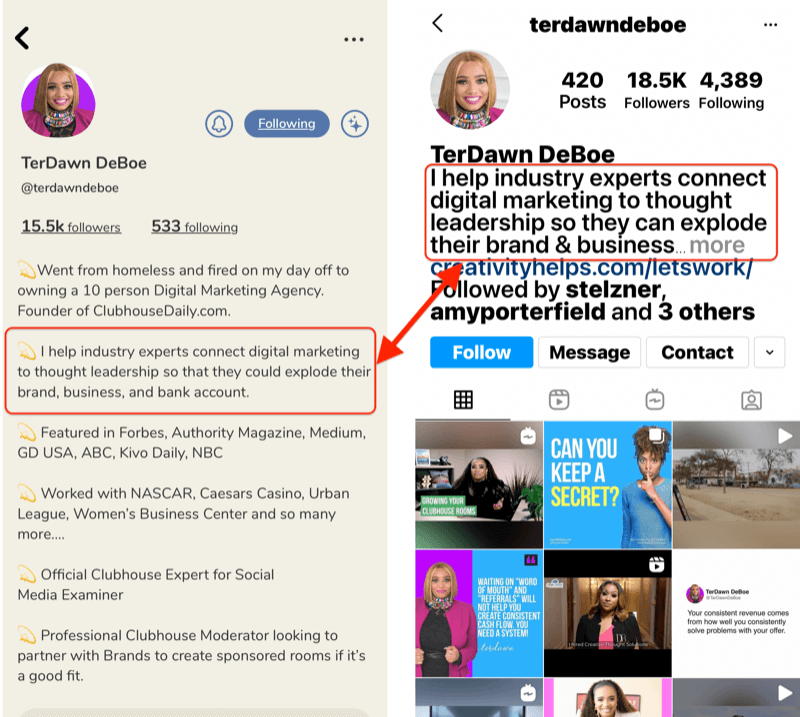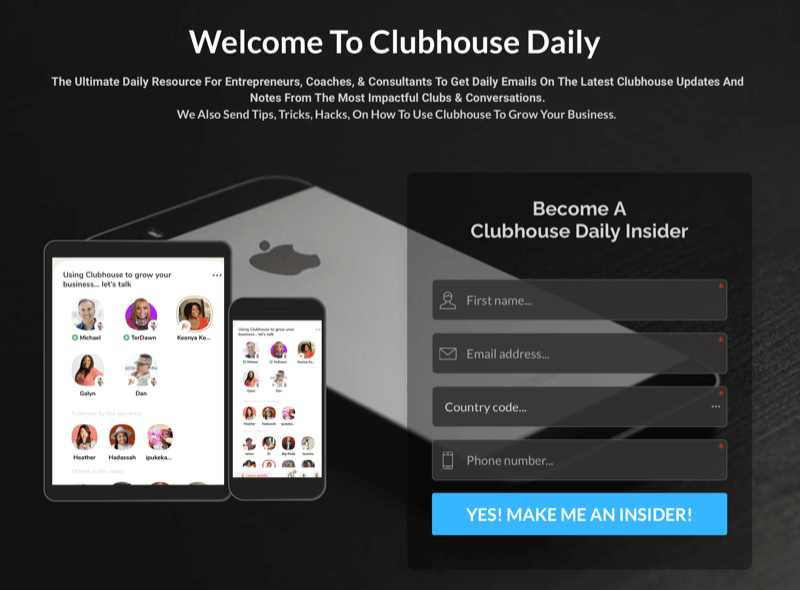Wondering if you should be using Clubhouse? Looking for a strategy to get the best return on your Clubhouse time?
In this article, you'll discover how your business can benefit from Clubhouse and learn a six-step strategy to maximize the return on the time you invest on the platform.

Why Businesses Should Consider Clubhouse
If you're a business owner or marketer, Clubhouse offers some unique advantages that make it worth considering.
On Clubhouse, you don't have to chase down your target market every time you log on. Your audience is already there and they want to engage in a conversation with you.
Because Clubhouse is a live audio platform, when you bring people onto the stage to ask a question, you can actually hear them speak. You can learn about your audience's concerns and desires directly from them. It's as close to a real-life conversation as you're going to get on a virtual platform.
The voice-only aspect makes Clubhouse a valuable content creation vehicle as well. It's much easier than live video because people don't have to get camera-ready to participate—all they need is a headset and their phone. With the real-time nature of the content and the ease of bringing people into the discussion, it allows you to have meaningful conversations and build know, like, and trust with your audience.
If you're just getting started on Clubhouse, you can be seen as an authority without having an audience right away. You can connect with people and get visibility by participating in other people's rooms and collaborating with them. Then once you get a feel for the platform, start creating and hosting your own rooms.
For a guided tour of Clubhouse and how to start and moderate rooms like a pro, watch the video below.
The PROFIT System: Develop a Clubhouse Strategy for Your Business
Whether you're a business owner, marketer, or voice representing your brand, Clubhouse can be an effective and efficient virtual marketing tool and a fast way to organic and on-demand traffic. But to make the most of the time you invest on the platform, you need to strategically align how you use it with your overall business goals.
Following this six-part system (with the acronym PROFIT) will help you develop a Clubhouse strategy that works for you:
- Positioning: Determine how you want people to perceive or experience you on Clubhouse and then convey it through your messaging.
- Return on intention: When you go on Clubhouse, it's important to know your intention for being there. First and foremost, you also always want to add value. But in addition to that, you also need to know how you're going to add to your overall strategy.
- Offer: Some of the people who hear you speak on Clubhouse will want to continue the conversation or deepen their relationship with you. Make sure you have an offer in place you can give them in exchange for their information.
- Funnel: Create a funnel that allows people to take a series of steps with you in their journey that will deepen their relationship with you, establish you as an authority, and prompt them to further engage with you by purchasing your products or services.
- Intentional traffic and conversion: Show your audience that you're the best at what you do.
- Tracking the data: It's important to track what you're doing on Clubhouse so you can continue to optimize your efforts or adjust your strategy.
Now let's look closer at how you can develop your positioning, intention, and offer for Clubhouse.
#1: Establish Your Positioning on Clubhouse
Outlining a strategy for Clubhouse starts with knowing how you want people to perceive you on the platform. This step is critical because when you're clear about what you want to be known for, what problems you're solving, and what sets you apart from others, people will begin to see you as an authority.
Include a Positioning Statement in Your Clubhouse Bio
When you're in a room on Clubhouse, there are three actions you can take: listen to someone speak, view their bio, or click on the Twitter or Instagram link in their bio. Even if you're not speaking, people will be looking at your bio and it should tell them everything they need to know about you.
Clubhouse makes it easy for people to quickly scan individual bios while they're listening and the action doesn't disrupt the room. Most of the time, people will look at your bio when you're up on the stage or followed by somebody who's up on stage.
Get World-Class Marketing Training — All Year Long!
Are you facing doubt, uncertainty, or overwhelm? The Social Media Marketing Society can help.
Each month, you’ll receive training from trusted marketing experts, covering everything from AI to organic social marketing. When you join, you’ll also get immediate access to:
- A library of 100+ marketing trainings
- A community of like-minded marketers
- Monthly online community meetups
- Relevant news and trends updates
Your bio is important to your positioning so you want to share your story, give any pertinent information that establishes you as an expert or authority in your niche, and/or explain what you do or want to be known for. Then when people hear you speak, it will solidify what's in your bio.

Additionally, your bio should include the topics you want to talk about. That way, if people are interested in collaborating on those topics, they'll know to come to you.
Provide Value in Clubhouse Rooms to Establish Your Expertise
Another part of your positioning is what you say when you're in a room. With the culture on Clubhouse, you can't simply tell people you're an expert and list your credentials. Yes, you want to be seen as an expert, but you do that by adding value to the conversation. Just touting yourself or your product or service is a surefire way not to get invited on stage again.
When you're invited to ask a question in a room, there's a certain etiquette to follow. Typically, start with, “My question is….” and then ask your question clearly and concisely. Don't give a long backstory—if someone needs to know more information, they'll ask you. If you're collaborating with someone, you can go into a little more detail but it's still important to introduce yourself succinctly. This is where your bio does the work so you don't have to.
Once you establish a reputation for asking good questions and enhancing the conversation, people will begin following you, moderators will start choosing you from the lineup of people whose hands are raised, and people will ask to collaborate with you.
Use Consistent Messaging on Your Twitter and Instagram Profiles
The third part of your positioning on Clubhouse involves your Twitter and Instagram profiles.

Discover Proven Marketing Strategies and Tips
Want to go even deeper with your marketing? Check out the Social Media Marketing Podcast! Publishing weekly since 2012, the Social Media Marketing Podcast helps you navigate the constantly changing marketing jungle, with expert interviews from marketing pros.
But don’t let the name fool you. This show is about a lot more than just social media marketing. With over 600 episodes and millions of downloads each year, this show has been a trusted source for marketers for well over a decade.
People who are interested in what you have to say on Clubhouse will check out your bio and click over to your Twitter and/or Instagram profiles to further engage with you. You don't want a disconnect in how you position yourself among your various accounts. Anything you represent, talk about, or have in your bio on Clubhouse should match the messaging people find on your Instagram and Twitter profiles.
For example, TerDawn's brand positioning statement, which is a few lines in her Clubhouse bio, matches what she has in her Instagram and Twitter bios. It's also consistent with the content she curates and the topics she talks about because these are things she wants to be known for.

#2: Set Expectations for Your Time on Clubhouse
Another key element of an effective Clubhouse strategy is setting an intention for being on the platform. Every time you're in a room, you're investing your time. As with anything you invest in, you should expect to get a return on your investment, or in this case, your intention. If you don't know what that intention is, you'll just end up wasting time.
With Clubhouse culture, the first intention is always to add value; that's non-negotiable. Every other intention you set will provide focus to the value you're adding. But your intention shouldn't be so rigid that you can't adjust it if an opportunity presents itself, such as if someone you want to collaborate with enters the room.
In addition to providing value, one of your intentions might be to get DMs in your inbox. In this case, you expect to provide so much value that people will DM you on Twitter or Instagram to have a private conversation, which could lead to something downstream.
If you develop products and services for your business, your intention might be to do market research by listening to the audience in rooms centered around your niche. You could jot down the questions you hear from the audience and turn them into your next piece of content you create or the next room you host. This research will help you better understand your audience so you can craft messaging that will speak to them.
Other intentions could be to curate a great conversation with like-minded individuals, collaborate with other industry experts, or increase the authority for your positioning. Whatever your intention is, knowing what it is will help you determine if you've invested your time wisely.
#3: Design an Offer to Generate Ongoing Engagement
One of the biggest challenges for marketers on Clubhouse is, “If I'm not supposed to pitch, how do I have an offer on Clubhouse?” Because your first intention on the platform is always to add value, your offer is just an extension of that. It's something of value that solves an immediate need or meets a desire of the audience.
Offering them something useful in exchange for their information plays a big role in continuing the conversation once a Clubhouse room has ended. When people opt into your offer, they'll continue to hear from you so you can keep the conversation going, deepen the relationship, and develop trust. The point of your offer in this case is to get ongoing engagement.
TerDawn's offer is Clubhouse Daily, which is a response to gaps she discovered in the marketplace. She listened to what people were saying was missing from their experience on Clubhouse and created a way for them to be a part of a community. In exchange for their name, phone number, and email, they get access to the Clubhouse Daily group where they can find people to collaborate with, get the resources they need, and engage and network with like-minded people.

Let's say you regularly host Clubhouse rooms and want to get people to show up every week and engage and participate. Whenever you host a room, you could share a URL with listeners where they can go to see future Clubhouse rooms you've scheduled and sign up to receive automatic calendar invites every time you have a new room. The value to your audience is they won't miss out on any rooms and you'll be able to continue communicating with them.
Your offer could also be a downloadable resource of value to your audience. Tell the audience in your room to DM you on Instagram to get the link, which would allow you to start a dialog. The other benefit is that when someone DMs you, they become an audience you can retarget with ads if you have a free or paid offer you want to send them to.
TerDawn DeBoe is a Clubhouse expert and business growth strategist who hosts a monthly masterclass called Clubhouse to Cash Flow. Connect with TerDawn (@TerDawnDeBoe) on Clubhouse, Instagram, Facebook, and TikTok.
Other Notes From This Episode
- Episode sponsored by Drip. Get a detailed guide and templates to setup your email campaigns. Try Drip free for 60 days.
- Connect with Michael Stelzner at @Stelzner on Instagram.
- Follow Michael Stelzner (@Stelzner) on Clubhouse and follow the Social Media Examiner Club.
- Sign up for the Social Video Summit at socialvideosummit.live.
- Watch exclusive content and original videos from Social Media Examiner on YouTube.
- Tune into our weekly Social Media Marketing Talk Show. Watch live on Fridays at 12 PM Pacific on YouTube. Listen to the replay on Apple Podcasts or Google Podcasts.
Listen to the Podcast Now
This article is sourced from the Social Media Marketing Podcast, a top marketing podcast. Listen or subscribe below.
Where to subscribe: Apple Podcasts | Spotify | YouTube Music | YouTube | Amazon Music | RSS
❇️ Help Us Spread the Word! Please let your Twitter followers know about this podcast. Simply click here now to post a tweet.
✋🏽 If you enjoyed this episode of the Social Media Marketing podcast, please head over to Apple Podcasts, leave a rating, write a review, and subscribe.
Attention Agency Owners, Brand Marketers, and Consultants

Introducing the Marketing Agency Show–our newest podcast designed to explore the struggles of agency marketers.
Join show host and agency owner, Brooke Sellas, as she interviews agency marketers and digs deep into their biggest challenges. Explore topics like navigating rough economic times, leveraging AI, service diversification, client acquisition, and much more.
Just pull up your favorite podcast app, search for Marketing Agency Show and start listening. Or click the button below for more information.

